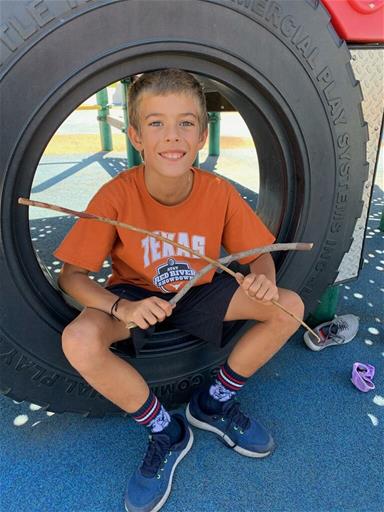God calls us to share the gospel and make disciples. But I have a confession to make: I chicken out. A lot.
What are they going to say? What if I offend them? What if they don’t like me because of it? What if I lead people farther from Christ instead of closer to him?
Sound familiar? These are some thoughts and fears I’ve experienced. How about you?
The call for every believer
Sharing the gospel can be scary. It may be one of the most uncomfortable things we can do as Christians. But we could stack evangelism right up next to prayer, communion, worship, reading the Bible or serving as one of the “normal” things a Christian should do. Yet, many of us don’t.
Some of us chalk up not doing evangelism to not having the gift. But evangelism isn’t just for the “professionals” — it is actually a call for every believer. God wants you to reach someone with the gospel.

Jesus said, “Therefore go and make disciples of all nations, baptizing them in the name of the Father and of the Son and of the Holy Spirit, and teaching them to obey everything I have commanded you. And surely I am with you always, to the very end of the age” (Matt. 28:19-20).
A few years ago, I wanted the people I pastor to share the gospel, but I wasn’t actually sharing it myself. I realized that I didn’t do evangelism because I didn’t know how. I read several books on evangelism, and even took a seminary class on it. But what I lacked was someone to disciple me and show me how to do it.
The more I pray and the more I share the gospel, the easier sharing the gospel becomes.
When one of my missionary friends was home on furlough, I asked him to show me how to share the gospel and make disciples with new believers. He agreed and suggested we go to a poorer part of town once a week, knock on doors and share the gospel.
Oh my gosh! This was way outside my comfort zone, and I was scared to death. In fact, I was constantly thinking about excuses to get out of this harvest time. But I stuck with it.
To my astonishment, people answered their doors and talked with us. They listened to the gospel and even accepted prayer from us.
One day we knocked on a door and met a 19-year-old gang member who was still a little hung over from the night before. We shared the gospel with him and saw him accept Christ as his Savior. We asked if we could come back and do a Bible study at his house. He said yes.
So, we came back and began discipling him. We taught him the gospel and what it means, and he shared it with his brother, who was the gang leader. His brother accepted Christ, too, and joined our Bible study. The next week, their sister joined us. Her brothers had shared the gospel with her, and she wanted to join our Bible study, too.
Suddenly a light went on. I get this evangelism thing now, I thought. I see how it works … or, how God works and how I can be a part of it.
I pushed past my fears and worries and saw the incredible blessing of obeying Jesus and living for his mission.
Feeling equipped
I think one of the best things we can do is make evangelism something “normal” for the church. At College Avenue Baptist Church, San Diego, California, we are equipping people to learn how to personally share the gospel.
I’ve seen some of my college students share the gospel and make disciples three generations deep: College students made a disciple, who made a disciple, who made a disciple. One of these students started discipling a single mom and the mom’s mother at their apartment complex, and even baptized one of them.
In his Why, When, How, author Ying Kai asked and answered a few questions that helped me and my students on our evangelism journey.
Why should I do this?
It seems a bit obvious, but the simple answer is because Jesus commanded us to. He told his disciples, “Go into all the world and preach the gospel to all creation (Mk. 16:15). Not only that, but God gave us a new job — to be his ambassadors in the world (2 Cor. 5:20). In fact, he has committed to us the message of reconciliation (the gospel), that “God was not counting people’s sins against them” (2 Cor. 5:19-20).
Who should I reach?

For many of us, we either are not sure who we can reach, or we feel the people in our lives are unreachable. I have found it helpful to ask people to draw a map of the people in their lives who are far from God (think areas of work, school, fun and family). Then write the names of the people that those people know who are far from God (written in blue).
Jesus says, “My prayer is not for them alone. I pray also for those who will believe in me through their message” (Jn. 17:20). I like to use this as a map to pray through daily (Lk. 10:2). “Lord, please bring _______ to faith.”
Some of us chalk up not doing evangelism to not having the gift. But evangelism isn’t just for the “professionals.” It is actually a call for every believer. God wants you to reach someone with the gospel.
What do I say?
Some of us have the desire to obey Jesus’ command to do evangelism, and we even know who to share with, but we are at a loss for what to say. I have learned that we need to have intentional conversations with people and be equipped with some simple tools.
An intentional conversation is a conversation with a purpose. It takes casual, everyday conversation like, “What class is your son in?” to more meaningful conversations like, “Has it been hard having your son start preschool?” before it eventually takes you to a spiritual conversation, when you can ask, “Can I pray for you?” We can move a spiritual conversation to an invitation by asking, “Would you be interested in doing a Bible study with me next week?”
A simple way to share the gospel
One tool in your belt should be a simple way to share the gospel. I have found that the 3 Circles gospel presentation, developed by Jimmy Scroggins, is really effective. One reason is that the second circle represents our broken world. Most people have experienced brokenness in their lives, so they can relate to how Jesus can fix sin and brokenness.
It is also incredibly simple. Even a child can do it.

Deacon is a 9-year-old at our church who learned how to share the 3 Circles in his Children’s Ministry class. We modeled sharing the 3 Circles, then we had our first graders through fifth graders practice drawing the picture and sharing the 3 Circles with their class friends. We asked them to write a list of people in their life who didn’t know God and share it with them.
A few months later, Deacon won a prize in his public school and chose the prize of having 20 minutes of teaching time in front of his class. When his mom asked what he was going to teach, Deacon responded, “I’m going to teach them the gospel.” His mom asked if she could help him prepare, but he said, “Mom, I got this. Pastor Bryan showed me how to do it.”
Deacon got up in front of his class and shared the gospel. He had each student in the class practice drawing the gospel presentation with each other just like we had taught him.
If Deacon can share the gospel, you can, too. Search for “3 circles gospel presentation” on YouTube to learn how.
When will I make time to do this?
This might be one of the hardest questions, because we all are so busy. I try to carve out one hour a week to intentionally share the gospel with others. I also try to pray every day for the people in my life who are far from God. What I have found is that the more I pray and the more I share the gospel, the easier sharing the gospel becomes.
You and I are disciple makers and God’s ambassadors. He has entrusted us to share his great message — the gospel. It is our job. As Paul asked, “And how can they believe in the one of whom they have not heard?” (Rom. 10:14).
Often, our worries spring from trusting in what we can do. But convincing and saving people isn’t up to us. It is up to God. In fact, God has provided the Holy Spirit to empower us to be his witnesses.
An acquaintance of mine once said, “God can use your stumbling, bumbling activity far better than your well-polished, well-learned inactivity.” So, let’s surrender to his command to make disciples. Will you join me?
